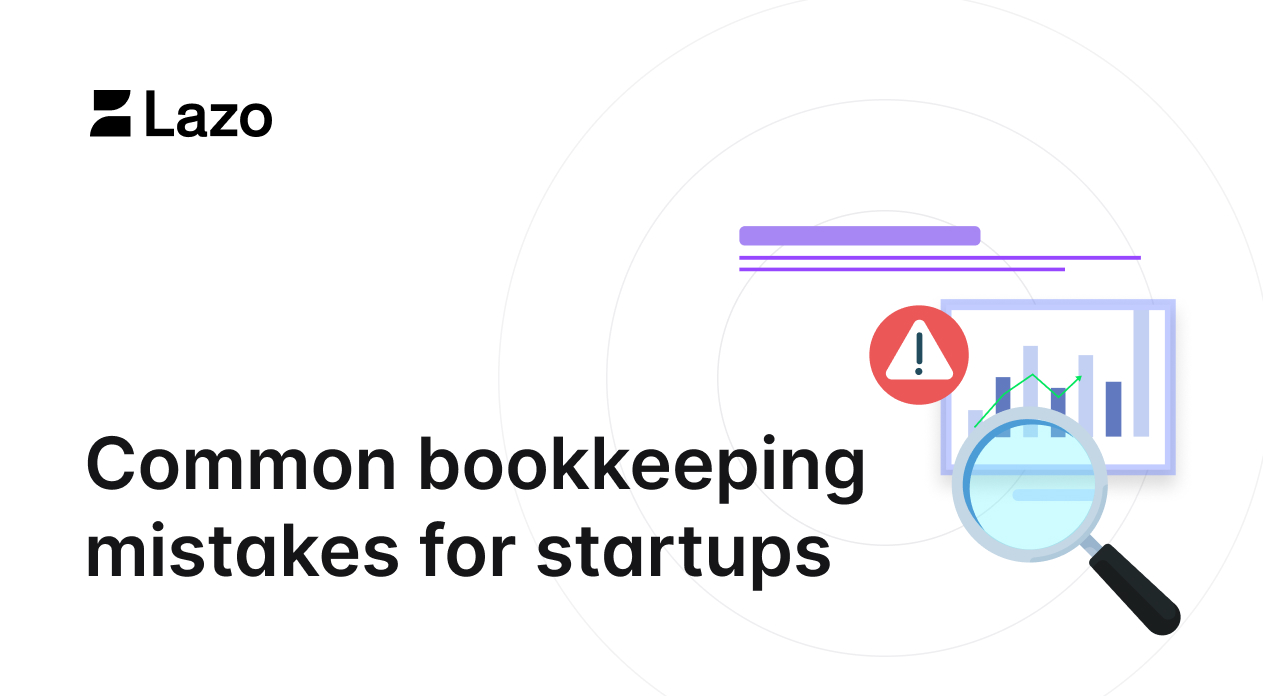Login to your Lazo One account here
Login

Bookkeeping isn’t glamorous. But if you’re a founder wearing multiple hats, chances are you’ve either tried to do it yourself or left it for “future you” to figure out.
Here’s the truth: early-stage bookkeeping mistakes can snowball into bigger problems—like tax penalties, bad decisions, and delayed fundraising.
Why early-stage startups struggle with bookkeeping
In the early days, it’s common to use the same credit card or bank account for both personal and business expenses. But this lack of separation creates a nightmare for tax prep and financial analysis.
Why it matters: It’s hard to track true business costs, and if you get audited, it can raise red flags.
How to fix it: Open a dedicated business bank account as soon as you incorporate. Use accounting software that lets you label and separate transactions clearly.
Reconciling means making sure that what’s in your books matches what’s in your bank. Skipping this step (or doing it just once a year) leads to inconsistencies, missed expenses, or duplicate income.
Why it matters: Inaccurate books mean misleading metrics. That can affect your decisions and investor confidence.
How to fix it: Set a monthly cadence for reconciliations. Use tools like QuickBooks or Xero—or better yet, work with a bookkeeper who handles this proactively.
One of the most common startup mistakes is waiting until March or April to look at the previous year’s numbers. This often results in a rushed, error-prone cleanup right before deadlines.
Why it matters: You’ll spend more time and money fixing problems that could’ve been avoided. And your CPA won’t have time to help with strategy—they’ll just try to make it work.
How to fix it: Bookkeeping should happen monthly. If you’re behind, start with a cleanup and set up a system to stay on track
When founders do their own books, they often label things incorrectly, like treating contractor payments as “office supplies,” or confusing capex and opex.
Why it matters: Misclassification distorts your financial reports and could impact your tax deductions or compliance obligations.
How to fix it: Use a proper chart of accounts and review common categories for your business type. Better yet, let a professional handle it to avoid missteps.
Your burn rate (how much you spend each month) and runway (how long your cash will last) are critical to decision-making and fundraising. But many founders don’t have these numbers at hand.
Why it matters: Without clear metrics, you may overspend or raise too late. Investors expect you to know your numbers cold.
How to fix it: Track these KPIs monthly using a dashboard or financial report. Lazo’s bookkeeping service includes reporting aligned with startup metrics.
If your startup sells to customers in different states (especially in SaaS or e-commerce), you may have sales tax obligations you’re not aware of.
Why it matters: Noncompliance can lead to penalties, back payments, and trouble during due diligence.
How to fix it: Use a tool like Stripe Tax or Avalara to track obligations, and make sure your bookkeeper knows where your customers are based.
Cash accounting records transactions when money moves; accrual records them when they’re earned or owed. Picking the wrong method can skew your financials.
Why it matters: If you recognize revenue too late or too early, you might appear less (or more) profitable than you are. That affects taxes and investor perception.
How to fix it: Talk to a bookkeeping or finance expert about what’s right for your business stage and model.
Bookkeeping errors don’t just affect your taxes—they slow down decision-making, block access to capital, and create unnecessary stress.
Outsourcing your bookkeeping can help you:
At Lazo, our startup-focused bookkeeping service keeps your records clean and aligned with your fundraising goals, so you’re always ready for what’s next.
You don’t need a finance team to stay on top of your books. You just need a system—and someone who knows what to look for.
Book a free consultation with Lazo’s bookkeeping experts and let us help you fix past mistakes and stay future-ready.
Of course you can.
That been said, most founders underestimate how much time it takes and how costly small mistakes can become. Your call!
If you're earning revenue, preparing for a raise, or spending more than a few hours a month on books, it’s time to switch.
Depending on complexity, anywhere from $300 to $1,000+/month. Lazo offers tailored plans for early-stage startups.
You could face penalties, lose investor confidence, or base key decisions on inaccurate data. Better to clean up now and stay on track.